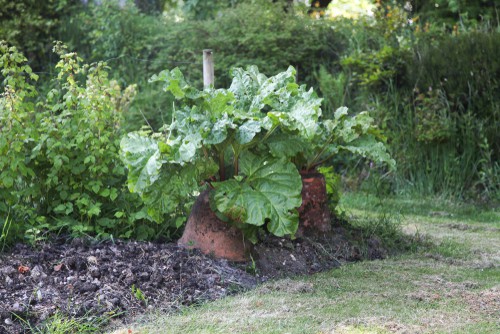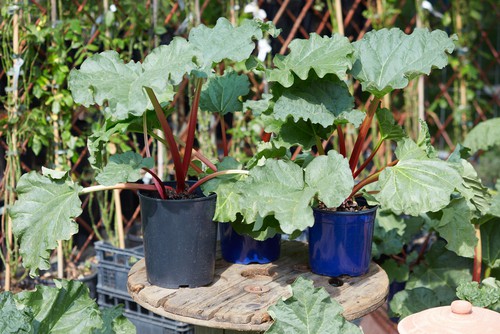Last updated on March 23rd, 2022
Our site is reader supported, this means we may earn a small commission from Amazon and other affiliates when you buy through links on our site.
If you want to grow rhubarb but simply don’t have the space in your garden, rest assured you can still grow it with limited space, as long as you are able to grow them in containers or large tubs.
Is growing rhubarb in containers possible?
Yes, you can grow rhubarb in containers. In fact, you can grow just about any plant in containers as long as you find a container that is big enough. With rhubarb, the width of the container is not nearly as important as the depth. The reason for this is that rhubarb has a very large and deep root structure.
Choose the largest pot you can find for rhubarb
When picking your container it should be at least 50cm deep and wide. It should also be made of a very strong, sturdy material. A cheap, flimsy plastic will not be able to support the weight of the mature rhubarb and all of the compost that will fill such a container.
Equally important is drainage. When picking the container for your rhubarb, the pot should have ample drainage holes. If it doesn’t and it is not made of a material into which you can drill extra holes, one solution is to add stones or gravel 5cm deep (at least) at the bottom of the container to help with drainage. If you have to do this, make sure to add the extra depth to your total container size requirements.
Growing rhubarb in large containers
Healthy rhubarb can live for a decade, providing you with 10 years worth of pink, red, or green-pink stalks for desserts and jams.

Once you have the container you need to make sure the potting soil you pick is a lightweight, well-draining potting soil. You can add to its buoyancy by mixing in some natural compost. We recommend using John Innes potting compost and then mixing plenty of farm manure or compost through it.
Planting rhubarb crowns and potted plants
When you purchase rhubarb from a garden centre or online, you should plant the crown at the beginning of spring. Dig a hole into your container that is 8cm deep and place the crown inside with any growing shoots facing upwards. Backfill around the crown with the remainder of your potting soil and set the container in a position where it will get full sun. Water it initially so that the crown gets wet but isn’t sodden. If you are planting a pot grown plant that is already growing then plant to the same depth as it already is in the pot.
Regular care of pot grown rhubarb
Water regularly
Once you have planted, tending to your rhubarb should be very easy. Any plants that you grow in a pot will dry out much faster compared to plants that are grown in the ground so, you should make sure to water it a bit more regularly than you do so with the plants in your garden, especially when the weather is hot.
Try to avoid watering the leaves. You want the leaves to stay dry, so water near the soil towards the base of the plant. In order to help with moisture retention, you can add a few centimetres of well-rotted farm manure mulch, bark chips or homemade compost to the top of the pot.

Feeding
With rhubarb you grow in the ground you don’t need to add fertiliser, however, when you are growing it in a container you should give it some fertiliser every year, right before the new growth appears in the spring. Add a general fertiliser such as growmore or fish blood and bone to the base of your plants and then water it well.
Don’t take any rhubarb until the second year
Your rhubarb has to mature into its second year before you are able to harvest. You can remove any flowers that start to blossom at the start of spring to force the plants to dedicate all of its energy into producing those delicious, stalks. Cut away any of the old stalks you did not use for food once the leaves die back later in the growing season.
Protecting rhubarb in pots over winter
Rhubarb needs to get cold, so we recommend protecting the roots before winter by wrapping the pot in a bubble wrap but don’t cover the crown with compost, mulch or use any fleece.
Dividing rhubarb in pots
If you are going to continue cultivating in your containers, after about four or five years you should divide the rhubarb so that you can continue growing multiple crowns without any single crown getting overcrowded. To do this, once the rhubarb has died back for winter, remove everything from the pot and use a sharp knife (or even a saw) to split the crown into several smaller pieces. Next, re-pot it again ready for spring. Remember to not take any rhubarb stems until the second season after you have potted the rhubarb crown which you divided.
Tip: The stalks are safe to eat and make delicious desserts, however, be sure to remove any leaves from the stalks you cut off of your rhubarb. The leaves are toxic to people and pets.
Overall, following these tips, you can grow rhubarb in your garden, even if all you have is a small balcony or patio. Just find the right container and give it a little extra care and you will be well on your way to delicious desserts.


